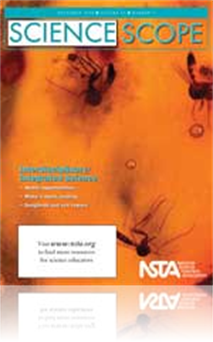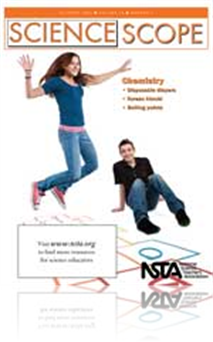All Science Scope resources
Journal Article
Editor’s Roundtable: Weaving a web of learning
Teachers of all content areas, the arts included, must collaboratively plan meaningful instructional units around themes, issues, or problems that can be investigated and assessed using a cohesive, interdisciplinary approach. Instruction should activ...
Journal Article
Search for the Golden Moon Bear: Using Reader’s Theater to Teach Science
Reader’s theater is an activity in which students, while reading directly from scripts, are able to tell a story in its most entertaining form. Typically, teachers create or purchase premade scripts of stories, and students focus on reading those s...
Journal Article
Amber: Using “Tree Tears Turned to Stone” to Teach Biology, Ecology, and More!
Amber is a fossil by itself, and can also contain plants and animals that lived millions of years ago. Some of these perfectly preserved specimens give scientists a convenient window to past environments, including the biology, ecology, geology, and ...
Journal Article
Scope on the Skies: Living with a star
Currently, our Sun is a content, middle-aged main sequence star steadily fusing hydrogen atoms into helium atoms and releasing radiation in many of the wavelengths making up the electromagnetic spectrum. So what happens between now and when the Sun r...
Journal Article
Tried and True: Inquiry-based dissolving
This project highlights a dissolving unit that was part of an eighth-grade, semester-long investigation into matter. During the dissolving unit, students explored the concepts of mixture, solution, dissolving, saturation, and conservation of mass. Di...
Journal Article
Science Sampler: The Element Walk
“The Element Walk” lesson is effective at teaching students the elements that exist in common substances encountered every day. Students walk away from the lesson with a set of general rules that help them to easily identify the elements around t...
Journal Article
Watching the Pot to Improve Inquiry Skills
The International Boiling Point Project is an online, collaborative project for students in grades 6–12 in which they investigate the impact of four factors (room temperature, elevation, volume of water and heating device) on the boiling point of w...
Journal Article
No More Leaks: A Process-Oriented Lesson Exploring the Invention and Chemistry of Disposable Diapers
High school chemistry can be intimidating to some students, so it is critical that we engage students in nonthreatening preparatory investigations during middle school. Based on the learning cycle model (Bybee and Landes 1990), this lesson invites st...
Journal Article
Scope on Safety: Science storage requirements
Middle school science teachers need to address two issues concerning storage. First, if it is insufficient, they need to work with administrators to secure additional storage area(s). Second, whether sufficient or not, good housekeeping practices are...




